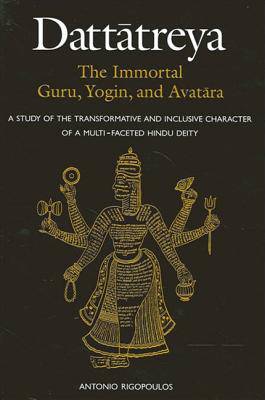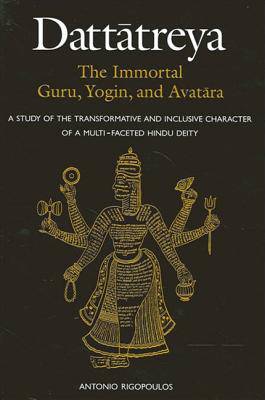
- Afhalen na 1 uur in een winkel met voorraad
- In januari gratis thuislevering in België
- Ruim aanbod met 7 miljoen producten
- Afhalen na 1 uur in een winkel met voorraad
- In januari gratis thuislevering in België
- Ruim aanbod met 7 miljoen producten
Dattātreya: The Immortal Guru, Yogin, and Avatāra
A Study of the Transformative and Inclusive Character of a Multi-Faceted Hindu Deity
Antonio RigopoulosOmschrijving
Presents the multi-faceted Hindu deity Dattatreya from his Puranic emergence to modern times.
This book presents the multi-faceted Hindu deity Dattatreya from his Puranic emergence up to modern times. Dattatreya's Brahmanical portrayal, as well as his even more archaic characterization as a Tantric antinomian figure, combines both Vaisnava Saiva motifs. Over the course of time, Dattatreya has come to embody the roles of the immortal guru, yogin and avatara in a paradigmatic manner. From the sixteenth century Dattatreya's glorious characterization emerged as the incarnation of the trimurti of Brahma, Visnu, and Siva. Although Maharastra is the heartland of Dattatreya devotion, his presence is attested to throughout India and extends beyond the boundaries of Hinduism, being met with in Sufi circles and even in Buddhism and Jainism via Nathism.
The scarce attention which most Western scholars of Indian religions have paid to this deity contrasts with its ubiquitousness and social permeability. Devotion to Dattatreya cuts through all social and religious strata of Indian society: among his adepts we find yogis, Brahmans, faqirs, Devi worshippers, untouchables, thieves, and prostitutes. This book explores all primary religious dimensions: myth, doctrine, ritual, philosophy, mysticism, and iconography. The comprehensive result offers a rich fresco of Hindu religion as well as an understanding of Marathi integrative spirituality: precisely this complexity of themes constitutes Dattatreya's uniqueness.
Specificaties
Betrokkenen
- Auteur(s):
- Uitgeverij:
Inhoud
- Aantal bladzijden:
- 342
- Taal:
- Engels
- Reeks:
Eigenschappen
- Productcode (EAN):
- 9780791436950
- Verschijningsdatum:
- 9/04/1998
- Uitvoering:
- Hardcover
- Formaat:
- Genaaid
- Gewicht:
- 625 g

Alleen bij Standaard Boekhandel
Beoordelingen
We publiceren alleen reviews die voldoen aan de voorwaarden voor reviews. Bekijk onze voorwaarden voor reviews.









